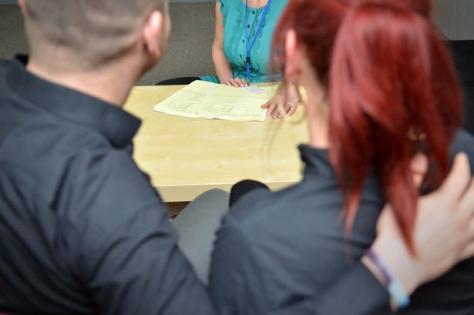"WHEN I heard about it, my wife was at the radiologist. She couldn’t get in to see the doctor. She was left standing on the street corner crying. I’m in tears racing over to get to her in the car. I called a friend on my way, who gave me the advice: “Make life as normal as you can because you are going to have to hold it all together”. So, I bit down on the leather.
Then I had to go and speak to each of our sons’ schools. I found every time I went to tell them, I broke down. Her parents fell into denial and didn’t even visit, and I didn’t know how to support them. Her sister got really worried about herself. I didn’t know how to bring our kids into it. One of our sons, who had always been such a happy kid, stopped smiling and laughing for some years. The woman has been the sun around which everything has revolved, and suddenly you find yourself in that position.
There was no support for the family. There was no advice. She had a lumpectomy, 12 months of normal chemo, then a different, new chemo, then had to wait 12 months to have a mammogram, and they found it again. Then she had a mastectomy, followed by radiotherapy. She chose not to get the rebuild. This all stretched over two years.
When she had the mastectomy, a nursing sister gave me a cassette from the husband of a survivor. It really changed everything. I needed a real man’s advice and where the hell was I going to get it? Men don’t share this stuff.
Well, I got it from this cassette. It answered a question I didn’t even know I had – how am I to behave to address not how I am feeling, but how she is feeling? It told me to stay in the practice of intimacy and not fall out of it. It told me to make sure that I touched her chest on both sides as though nothing had changed. The fact that her breast had gone didn’t matter to me, what mattered was giving her the response she wanted and needed.
People talk about the woman’s journey. There is also a partner’s journey, and mine had several different phases. I spent the first two years being very strong, as primary carer. Then I became really angry and went into a very dark place where it all fell apart for me for a few years. I felt like my contract with life was null and void, everything could be taken away from me and there was nothing I could rely upon. Hope was sucked out. I had to travel a lot for work and alone in my hotel room I would call friends up at midnight because I didn’t have confidence I would be awake in the morning. I never would have thought that three to five years later, I’d be feeling like that.
Even years later, you’re living in agony every time she feels unwell or sore because you know she hasn’t told you everything and it could be a recurrence.
If someone had just said to me, this is how it will play out; these are the phases you need to watch out for; here is a roadmap ... that would have made a difference."
Ending the silence
Peter's story is reproduced from a booklet produced by the National Breast Cancer Foundation aimed at ending the silence for men whose partners have breast cancer.
The CEO of NBCF, Carole Renouf, says there is a culture of "omerta" amongst men when it comes to expressing their feelings or their bewilderment about what their partner is going through, yet a breast cancer diagnosis has an impact on the entire family.
“When you’re confronted with the fact that your wife has just been diagnosed with breast cancer, it can feel overwhelming. I tried to speak to family and friends – some tried to be helpful but they didn’t really know what to say or what to do or how to offer the support that I needed,” according to Brian Brady, father of three, whose wife was diagnosed with breast cancer three years ago.
“There was help for my wife, there was information available on how to help the kids, but for me there was nothing.
“Some of my mates wanted to take me out for a beer and show me a ‘good time’ to help me forget. All I wanted was someone to have a chat to but in that situation, mates will do anything rather than listen.”
The Ending the Silence booklet is available at NBCF.org.au.








 Agree (1)
Agree (1) Disagree (
Disagree (











__small.png)










